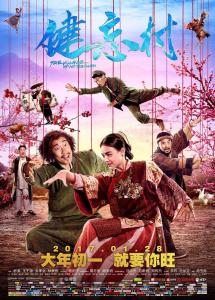During the first months after the fall of the Qing dynasty and the rise of the Republic of China, Shi Baopi (Eric Tsang), a rich man, is colluding with bandits known as the Cloud Clan to take control of Desire Village, an isolated hamlet which may hide a treasure. But Big Pie, his mole in the village, drops dead after eating a poisoned bun. His widow, Autumn (Shu Qi), is suspected to have killed him, as their marriage was not a happy one : she had been promised to her childhood love, the mayor’s son Ding (Tony Yang), but he vanished after going to the city to pass an exam. Now, just as Autumn is about to be subjected to the wrath of the townsfolk, despite the efforts in her defense of a newcomer to the village and self-professed martial arts master (Joseph Chang), a mysterious man named Fortune Tien (Wang Qianyuan) arrives on a luminous chariot, and presents to the bewildered villagers a strange contraption, the “Worry Rider”. It is a kind of metal helmet that allows for the removal of bad memories from anyone’s mind. Soon, Fortune Tien turns the whole village into happy idiots obeying his every command, and has them digging around for treasure, having made Autumn his wife. But the Cloud clan is still preparing to attack the village, and to complicate matters, Ding finally returns…
Chen Yu Hsun’s The Village of no Return is a delight from start to finish, blissfully silly, visually stimulating and for all its sunny imagery, mercilessly dark. It deals in archetypes of the rural comedy – the isolated village as a microcosm of human society, the corrupt businessman, the misguided mayor, the wily charlatan, the resilient widow, the prodigal son – but makes them fresh again in a quirky and satirical danse macabre that is consistently hilarious. Village comedies are often stagey by nature, but here it is not the case, thanks to Chen’s visual inventiveness, with many inspired visual gags and superb shots where depth of field is exploited to the fullest, Owen Wang’s enjoyably mischievous score and Yao Hung-i’s ravishing cinematography,lushly colorful but with the subdued elegance of waterworks.
The humor is madcap, often buffoonish, but never tiresome or too local in expression, in the way Wong Jing’s (or even sometimes Stephen Chow’s) comedies can be. The Cloud Clan is a bunch of army-deserters who constantly sing and beatbox, even as they are attacking the village. Their leader is a butch woman who doubles as a postman and spends the film trying to master an “iron horse” (a bike) and slashing throats with a giant spatha knife. and this is just a sample of the silly offbeat delights of The Village of no Return.
And Chen Yu Hsun can rely on a superb cast. Shu Qi is a heady mix of sweet, ingenuous and mischievous, and at times effortlessly affecting ; Joseph Chang has excellent comic timing as a kind but half-witted martial arts master who calls himself “the Magic Knuckle King”, Tony Yang deftly subverts his archetypal alpha male role, while Eric Tsang is a welcome sight sporting a stupid hairdo, in a short cameo. But the film belongs to Wang Qianyuan, who is simply irrepressible and irresistible as a ruthless conman, all thunderous grandstanding, slimy congeniality and self-satisfied fiendishness. Witness him dance in unfettered glee, holding a paper windmill in each hand, around the village whose inhabitants he has turned into oblivious fools. He is magnificent.
But there is also darkness to this film. One of its first images is of two flying kites, made of human skin. It has a great running joke of people failing to commit suicide (a woman is too fat for the well she jumped in, another gags on the pungent poison she tries to ingest, and so on…). But more importantly, as a rural satire, it has a genially merciless view of human stupidity and its dire consequences. Ignorance is bliss, but it is just that, ignorance; and its bliss is short-lived. Squint hard enough, and you’ll see in this story of a man brainwashing an entire village into letting go of their memories and blindly doing his bidding (while imprisoning those who refuse to forget), sometimes to the cost of fratricide, a metaphor of Chairman Mao’s Cultural Revolution, its fratricidal horrors and its destruction of China’s traditional cultural heritage.
There’s also a philosophical depth to the film, a questioning about the proverbial relationship between ignorance and bliss. Ignorance might be bliss, but it’s still ignorance, and its bliss is doomed to implode, as in the thunderously brutal yet hilarious village attack near the end of the film. And while emotional pain may be hard to bear, erasing it is akin to amputation of the soul. Shades of Michel Gondry’s Eternal Sunshine of the Spotless Mind here, as Shu Qi reads a love letter to her long-lost love Tony Yang, who can but stare, dead-eyed and befuddled, having been subjected to the “Worry Ridder”. The contraption itself is a wonderful film prop, quirkily intricate and unabashedly silly in appearance. Much like the film itself.
Long Story Short: The Village of no Return is a delight from start to finish: blissfully silly, visually stimulating and for all its sunny imagery, mercilessly dark. ****


